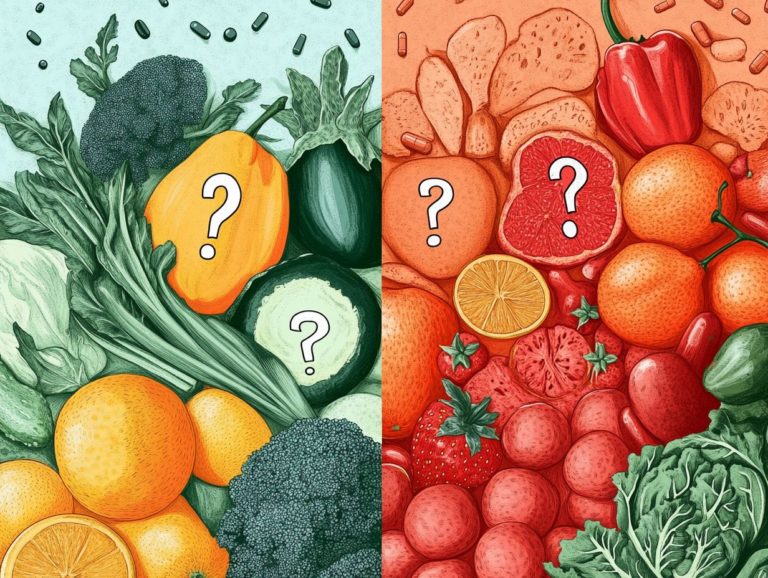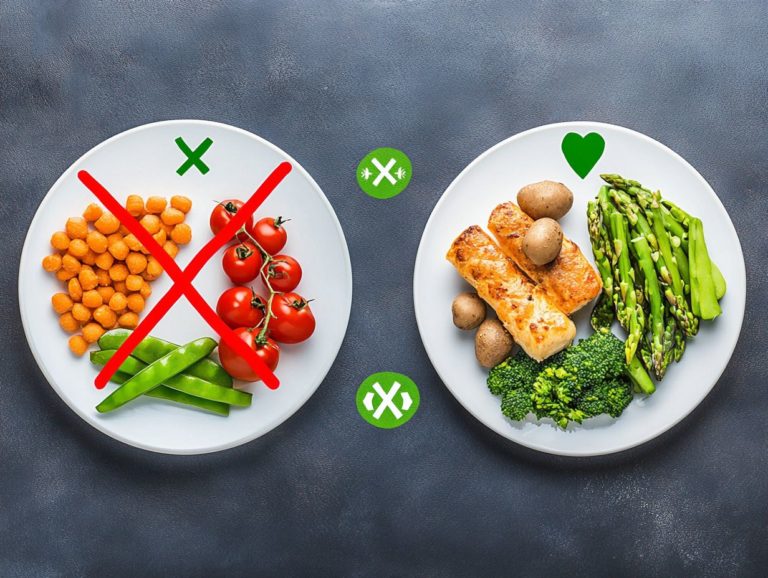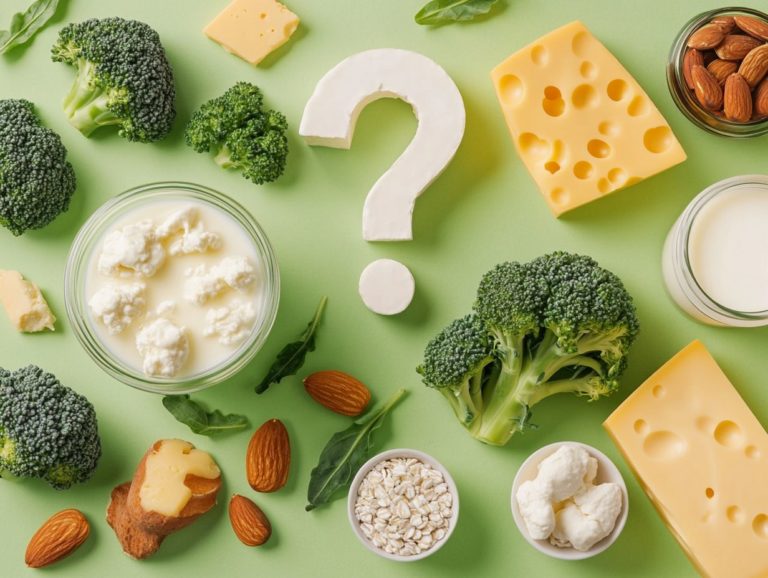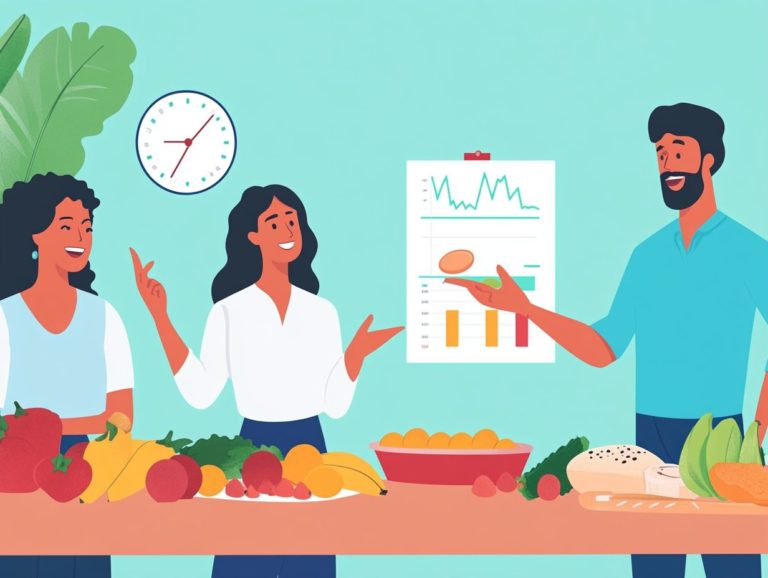The Myth of ‘Magic’ Foods for Weight Loss
In today’s world, your quest for effective weight loss can often feel like navigating a maze of misconceptions, especially regarding those so-called ‘magic’ foods.
These alluring promises can be deceptive, leaving you frustrated and confused. Let s uncover the truth about these myths together, providing you with clarity on what genuinely contributes to sustainable weight loss.
You ll discover the importance of maintaining a balanced diet, the pitfalls of fad diets, and practical tips for cultivating a healthy relationship with food.
Join in as you explore the facts and equip yourself with the knowledge necessary to make informed choices on your weight loss journey.
Contents
Key Takeaways:

- There is no such thing as a “magic” food for weight loss.
- The concept of certain foods having special weight loss properties is a myth.
- Healthy weight loss is achieved through a balanced diet and regular exercise, not by relying on fad diets or “magic” foods.
- Develop a healthy relationship with food by focusing on nourishing your body with a variety of nutritious foods.
- Avoid restrictive diets that can lead to potential health risks and deficiencies.
Understanding Weight Loss Myths
Understanding the truth about weight loss myths is crucial for achieving your goals. Many common misconceptions can lead to ineffective strategies and potentially harmful health consequences.
Misguided notions about calorie deficits, along with the allure of ‘magical foods,’ can cloud your judgment and impede your progress.
Insights from reputable institutions like the CDC, along with guidance from esteemed registered dietitians such as Dr. Nisha Patel at California Pacific Medical Center, can illuminate these misconceptions, offering you a clearer path toward sustainable weight management.
What are ‘Magic’ Foods?
“Magic” foods often entice you with the promise of extraordinary weight loss effects without requiring any lifestyle adjustments, crafting a deceptive allure for those grappling with their diets.
Items like grapefruit, touted for fat burning, or quinoa, celebrated for its myriad benefits, tend to be marketed for their health properties. However, the truth is that no single food can replace a balanced diet and healthy eating habits.
It’s easy to fall for these so-called miraculous options, hoping that adding them to your meals will yield quick results. Such beliefs can easily lead you astray.
Consider the notion that avocados are a weight loss miracle because of their healthy fats. While they are indeed nutritious, overindulgence can result in excessive calorie consumption.
Misunderstood foods often shift the focus away from the crucial importance of moderation and a holistic approach to health. Achieving sustainable weight loss relies on a combination of nutrient-rich foods, regular exercise, and mindful lifestyle changes, rather than placing your hopes on isolated items that promise effortless transformation.
The Truth About ‘Magic’ Foods and Weight Loss
The reality of so-called ‘magic’ foods is that while they may provide certain health benefits, they are far from a replacement for a well-rounded diet that includes sufficient protein and fiber essential for effective weight loss. It’s important to be aware of common myths about weight loss to make informed choices.
You might be captivated by the promise of these foods, thinking you can indulge in them alone and still meet your weight loss aspirations. However, this often results in disappointment and frustration.
Dietary guidelines clearly indicate that a healthy diet stems from balanced nutrition, not from placing undue reliance on individual foods.
Debunking Common Myths

Debunking common weight loss myths is vital as you navigate the often overwhelming landscape of diet and health information.
You might think that following trending diets like the keto diet will yield instant weight loss. However, this belief often arises from misconceptions rather than solid scientific evidence.
For example, the notion that certain foods can drastically boost your metabolism is a myth that could mislead you on your weight management journey.
You might also believe that skipping meals will speed up weight loss. Research from the American Journal of Clinical Nutrition shows that this tactic can lead to increased hunger and even overeating later.
Instead, embracing a well-balanced diet rich in whole foods, combined with regular physical activity, is the sustainable path to achieving and maintaining a healthy weight.
Experts are excited to share that understanding your unique body chemistry and energy needs is crucial, rather than following one-size-fits-all solutions often highlighted in popular media.
Healthy Eating for Sustainable Weight Loss
Healthy eating serves as the foundation for sustainable weight loss. Focus on foods rich in nutrients that align with dietary guidelines while ensuring you receive adequate protein and fiber for a balanced lifestyle.
To achieve long-term weight management, grasping the principles of nutrition is crucial. Pay particular attention to portion control and include a diverse array of healthy foods. This approach not only helps regulate your hunger but also maintains your energy levels.
By embracing these principles, you can cultivate habits that facilitate weight loss while enhancing your overall well-being.
Importance of Balanced Diet and Exercise
The significance of a balanced diet paired with regular exercise cannot be overstated when aiming for effective weight loss and overall health. It s not merely about cutting calories or chasing after ‘magic’ foods. A well-rounded diet ensures all your nutrient needs are met.
Meanwhile, exercise ramps up your metabolism the process your body uses to convert food into energy and supports fat loss. Together, they create a powerful synergy that fosters long-term weight management and well-being.
This powerful combination improves your fitness and sharpens your mind. To cultivate a sustainable exercise routine, consider incorporating activities you genuinely enjoy be it dancing, hiking, or cycling. This makes it much easier to stick to your routine over time.
Pair that with mindful eating practices, such as preparing meals with whole foods and being aware of portion sizes, to align your dietary choices with your unique nutrient requirements.
Over time, these habits can help you build a lifestyle that promotes lasting health benefits and gradually guides you toward successful weight loss.
Dangers of Fad Diets and ‘Magic’ Foods
The allure of fad diets can seriously endanger your health don’t fall for their promises. Many of these diets advocate for extreme restrictions, leading to nutritional deficiencies that compromise your well-being.
While they may promise quick weight loss, those short-lived results often come at the expense of vital nutrients, ultimately impacting your overall health.
Without expert guidance, you might find yourself turning to dietary supplements that could interact negatively with your medications or worsen pre-existing health issues.
Potential Health Risks and Nutritional Deficiencies

The potential health risks and nutritional deficiencies tied to fad diets are concerning, especially for those dealing with obesity or type 2 diabetes. These diets often lack essential nutrients crucial for optimal health.
Many popular diets, marketed as quick fixes, offer little variety. This can lead to inadequate nutrient intake, complicating existing health conditions and interfering with overall well-being. It’s crucial to recognize these risks now to make informed dietary choices!
Take the ketogenic diet, for example. While it promotes high fat and low carbohydrate intake, it can easily result in deficiencies in vitamins and minerals if you re not careful. This could affect your energy levels and cognitive function. Then there s the juice cleanse craze, which might sound appealing but can quickly lead to drastic caloric restriction, leaving you feeling fatigued and nutrient-depleted.
Scientific studies show that sticking to such restrictive diets for too long can lead to significant metabolic shifts, putting undue stress on your body s systems. These real-world examples emphasize the importance of maintaining a balanced diet. Incorporating a variety of food groups ensures you get the necessary nutrition while effectively managing your weight.
Developing a Healthy Relationship with Food
Cultivating a healthy relationship with food is essential for sustaining a diet that supports your lifestyle choices. Recognizing emotional triggers that lead to unhealthy eating patterns allows you to make conscious decisions that prioritize foods rich in nutrients, ultimately promoting your overall health.
By adopting practical strategies for maintaining a nutritious diet, you can elevate your well-being and establish a balanced approach to how you consume food.
Tips for Maintaining a Healthy Diet and Lifestyle
Maintaining a healthy diet and lifestyle requires intentional effort and strategic planning, especially in today s fast-paced world where convenience often takes precedence over health. Key strategies include meal prepping, incorporating a diverse array of nutritious foods, and consulting a registered dietitian to tailor your dietary choices to your individual needs.
By embracing these strategies, you’ll find it easier to manage your weight and foster long-term health.
Prioritizing balanced meals featuring lean proteins, whole grains, and plenty of fruits and vegetables can significantly enhance your overall nutrition. Engaging in regular physical activity not only helps maintain a healthy weight, but also elevates your energy levels and improves your mood.
Emotional well-being plays a vital role in your journey. Practicing mindfulness and managing stress can reduce emotional eating and encourage a more thoughtful relationship with food. Seeking professional guidance enables you to make informed choices, ensuring that your path to health is sustainable and enjoyable.
Frequently Asked Questions
What is the myth of ‘magic’ foods for weight loss?
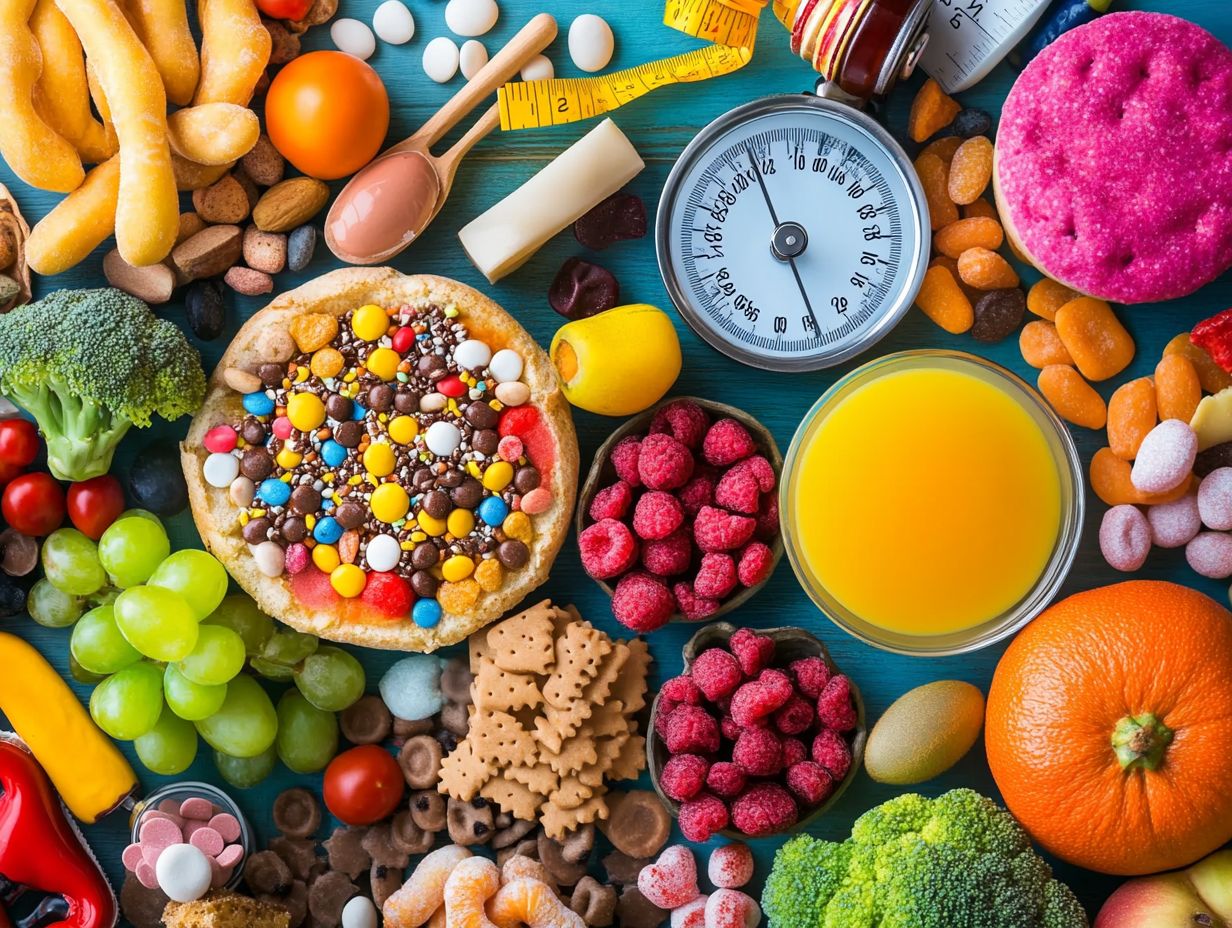
The myth of ‘magic’ foods for weight loss is the belief that certain types of food can help you lose weight without effort or lifestyle changes. This belief gets repeated over and over again by marketing tactics and pseudoscientific claims, but understanding the truth about weight loss myths can help clarify these misconceptions.
Do ‘magic’ foods actually exist?
No, there is no such thing as a ‘magic’ food. All foods contain calories, and it s the overall balance of calories consumed versus calories burned that determines weight loss or gain.
What are some common examples of ‘magic’ foods?
Common examples of ‘magic’ foods include superfoods like acai berries, goji berries, and chia seeds, as well as fad diets promoting specific foods like cabbage soup or grapefruit as weight loss aids.
Why do people believe in ‘magic’ foods for weight loss?
The belief in ‘magic’ foods for weight loss often stems from a desire for a quick fix or an easy solution. People may also be influenced by misleading marketing tactics and the constant bombardment of conflicting information about diet and nutrition.
Start your journey to a healthier lifestyle today!
Are there any negative consequences of believing in ‘magic’ foods for weight loss?
Yes, believing in ‘magic’ foods can lead to disappointment and frustration. When weight loss doesn t happen, it can foster an unhealthy relationship with food and reliance on quick fixes.
What is the most effective way to lose weight?
The best way to lose weight is to maintain a balanced diet and stay active. Healthy habits like getting enough sleep and managing stress are equally important.
There s no ‘magic’ solution for weight loss. Focus on making healthy changes that you can stick with for lasting results!
Consulting with a healthcare professional or dietitian can help you create a personalized weight loss plan based on your needs.

